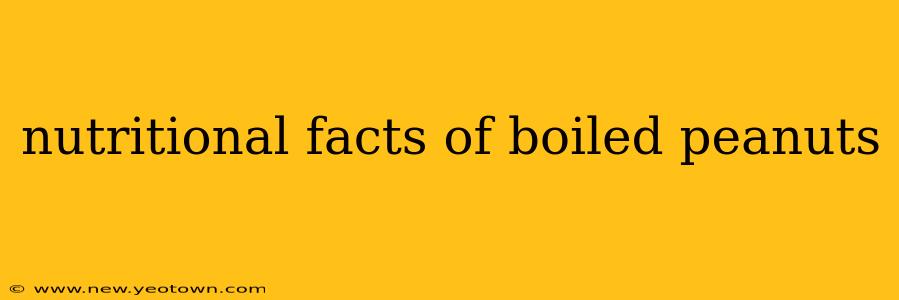Boiled peanuts. The very name conjures images of warm, salty pods, a quintessential Southern treat enjoyed roadside and at backyard barbecues. But beyond the comforting familiarity lies a surprising nutritional profile packed with benefits you might not expect. This isn't just a salty snack; it's a powerhouse of nutrients, offering a unique blend of protein, fiber, and essential minerals. Let's delve into the fascinating world of boiled peanut nutrition.
What are the nutritional benefits of boiled peanuts?
Boiled peanuts are a surprisingly good source of several essential nutrients. One cup of boiled peanuts (approximately 150 grams) offers a healthy dose of protein, contributing to muscle building and repair. They're also a great source of fiber, aiding in digestion and promoting gut health. This fiber content contributes to feelings of fullness, making them a potentially helpful snack for weight management. Beyond protein and fiber, boiled peanuts provide essential minerals like magnesium, potassium, and manganese, all vital for various bodily functions.
How many calories are in boiled peanuts?
The calorie count of boiled peanuts varies depending on preparation methods and the size of the serving. However, a one-cup serving generally contains around 200-250 calories. While this might seem modest, it's crucial to remember portion control, as consuming large quantities can quickly increase your overall calorie intake.
Are boiled peanuts good for weight loss?
While boiled peanuts aren't a "miracle weight-loss food," their high fiber content and moderate protein levels can contribute to a healthy weight management strategy. The fiber promotes satiety, helping you feel full for longer and potentially reducing overall calorie consumption. However, it's essential to incorporate boiled peanuts into a balanced diet and exercise routine for optimal weight loss results. Overconsumption, due to their calorie density, can negate any potential weight-loss benefits.
Are boiled peanuts high in sodium?
This is a crucial point to consider. Many boiled peanut recipes involve significant amounts of salt for flavor enhancement. Consequently, they can be relatively high in sodium. Individuals watching their sodium intake due to health conditions like high blood pressure should be mindful of their consumption and consider choosing lower-sodium options or preparing them at home with reduced salt.
What are the health benefits of eating boiled peanuts?
The nutritional profile of boiled peanuts offers several potential health benefits:
- Improved Digestion: The high fiber content supports healthy digestion and bowel regularity.
- Increased Energy Levels: The carbohydrates provide sustained energy throughout the day.
- Stronger Bones: The presence of minerals like magnesium and manganese contribute to bone health.
- Muscle Growth and Repair: The protein content supports muscle building and recovery.
However, it's vital to remember that these benefits are maximized when boiled peanuts are consumed as part of a balanced and varied diet.
Can you eat the shells of boiled peanuts?
No, you should not eat the shells of boiled peanuts. The shells are tough, indigestible, and can potentially cause digestive discomfort or even choking hazards. Always discard the shells before consumption.
Are there any downsides to eating boiled peanuts?
While generally healthy, there are some potential downsides:
- High Sodium Content: As mentioned, commercially prepared boiled peanuts often contain high levels of sodium.
- Potential Allergic Reactions: Some individuals may have allergic reactions to peanuts.
- Digestive Issues (in excess): While fiber is beneficial, overconsumption can lead to digestive upset for some individuals.
As with any food, moderation is key to reaping the benefits and avoiding potential drawbacks.
In conclusion, boiled peanuts offer a unique blend of nutrition, providing a satisfying snack or side dish that goes beyond simple enjoyment. By understanding their nutritional profile and consuming them mindfully, you can incorporate this Southern staple into a healthy and balanced diet. Remember to always pay attention to portion sizes and sodium content for optimal health benefits.

